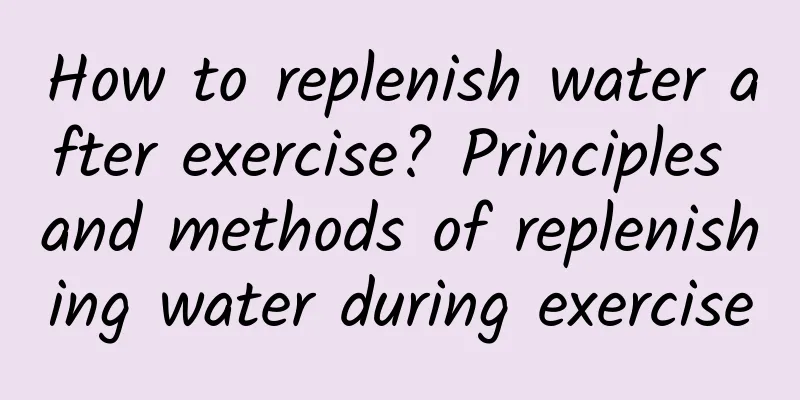How to replenish water after exercise? Principles and methods of replenishing water during exercise

|
Exercise is the best way to maintain health. With the continuous improvement of people's living standards, more and more people like to exercise, especially men. If you are tired from work every day, you can use exercise as a way to keep fit and relieve stress. So, how to replenish water before and after exercise, what methods should be used and what principles should be followed? Don't drink too much before exercise Under normal circumstances, the human body excretes about 1500 ml of urine a day, plus the water from feces, breathing or evaporation from the skin, a total of about 2500 ml of water is consumed, and the human body can only replenish about 1000 ml of water from food and metabolism every day. Therefore, a normal person needs to drink at least 1500 ml of water every day, about 8 cups, to maintain our normal body metabolism. But if you do strenuous exercise, you need to take in more water to prevent dehydration. This is not only to prevent the body from becoming dehydrated due to excessive lack of water, but also to ensure that your body is always in the best state for exercise. You should take in 2 to 3 cups (500 to 700 ml) of water within 2 to 3 hours before exercise to ensure that your body is not dehydrated before exercise. If you are always hydrated, you don't need to take in too much water, because the body cannot store too much water. But if it is summer, the weather is hot and the consumption is high, so the frequency of water replenishment should be appropriately increased. Sports drinks are the best for hydration During exercise, the water metabolism rate accelerates and a large amount of water is lost. Therefore, water should be replenished every 15 to 20 minutes, and 0.5 to 1 cup (120 to 230 ml) of water should be drunk each time. However, when the exercise time is too long, more than 60 minutes, or when the exercise is high-resistance exercise, sports drinks are needed. Because intense exercise will cause the electrolyte metabolism process in the body to accelerate, and a large amount of electrolytes will be lost with sweat. Therefore, water, sugar and electrolytes should be replenished together. If you do not pay attention to fluid replenishment during exercise, it may lead to sports dehydration. Sports drinks generally contain sugar and electrolytes, and the components and contents of various nutrients can adapt to the physiological characteristics and special nutritional needs of athletes. Many athletes drink sports drinks between games. In addition, the amount of fluid replenishment during exercise should generally not exceed 800 ml, and must be taken in small amounts and multiple times to avoid excessive burden on the gastrointestinal and cardiovascular systems caused by a large amount of fluid replenishment at one time. When performing high-intensity exercise in high temperatures, the amount of fluid replenishment per hour should be greater than 300 ml. It should be noted that sports drinks are not suitable for everyone. People with high blood sugar or diabetes should be particularly cautious when drinking. In addition, people with high blood pressure, poor heart function or kidney function should not drink a lot to avoid increasing the burden on the heart and kidneys. In addition, it is generally not recommended to drink sports drinks containing carbon dioxide gas before and during exercise, which will cause bloating in the stomach and is not conducive to exercise. Drink water according to your heartbeat after exercise After exercise, the body is still in the excitement stage and the heart rate has not returned to normal immediately. Therefore, try to keep the drinking speed as slow as possible, keep the rhythm as consistent as possible with the heart rate, and drink intermittently in multiple times. This will allow the heart to absorb water in an orderly and sufficient manner. Do not drink too cold water before, during, or after exercise to avoid excessive stimulation of the intestines. The water temperature can be between 37℃ and 39℃. How much water you drink after exercise is related to your body weight. In principle, for every 0.5 kg of weight loss, you should increase your water intake by 2 to 3 cups, about 500 to 700 ml. |
<<: There is a science to drinking tea at the right time. Is it good to drink tea at night?
>>: Just get used to it? What should I do if my husband snores?
Recommend
What causes sperm head deformity?
Everyone knows that there are a large number of s...
Which department is better for orchitis?
Some men often have symptoms of testicular pain. ...
What should I do if my husband's sexual ability decreases?
In daily life, we often hear many female friends ...
What are the differences between renal deficiency alopecia and seborrheic alopecia?
For us humans, physical health is related to many...
Symptoms of penile vascular obstruction
Most cases of glans vascular sclerosis are caused...
What should I do if there are grains on the glans and labia?
In our current life, the pace of our life is gett...
Can I have sex with prostate hyperplasia?
Prostatic hyperplasia is a common prostate diseas...
How do men prevent pregnancy?
How should men prevent pregnancy best? There are ...
A man's private posture can predict his life span
A person's health condition can be seen from ...
What to do about prostatitis and infertility?
Prostatitis is a common and frequent disease in t...
What is the best way to treat glans inflammation?
Speaking of galactitis, it makes people crazy. Al...
How to treat penile induration
The surface of the male penis should be smooth, b...
Can white cardamom treat bad breath? The easiest way to get rid of bad breath
Bad breath is really embarrassing, and people wit...
Men don't get hard, why?
The pain that a man's erection is not hard ca...
How to improve acne and enlarged pores
Facial care is not just for women, but also attra...









